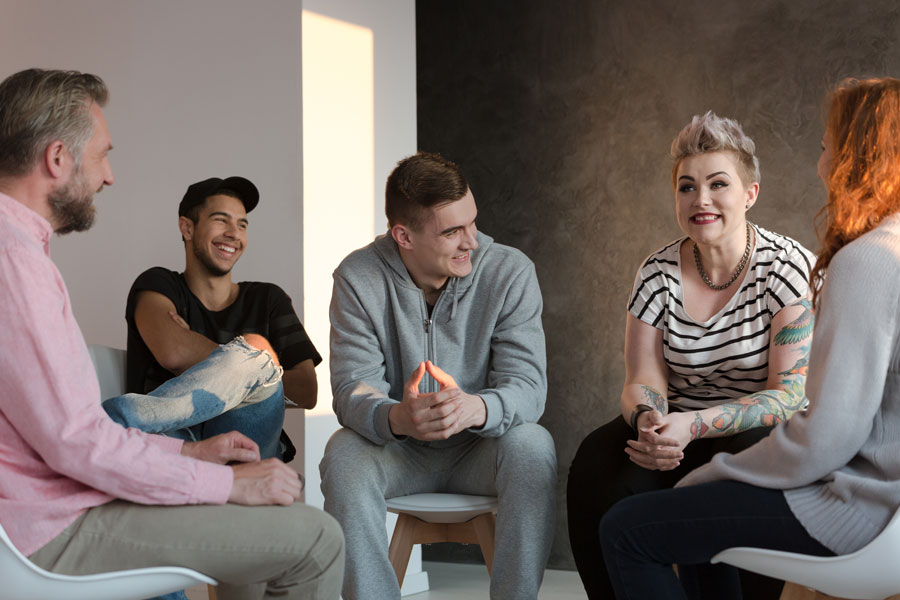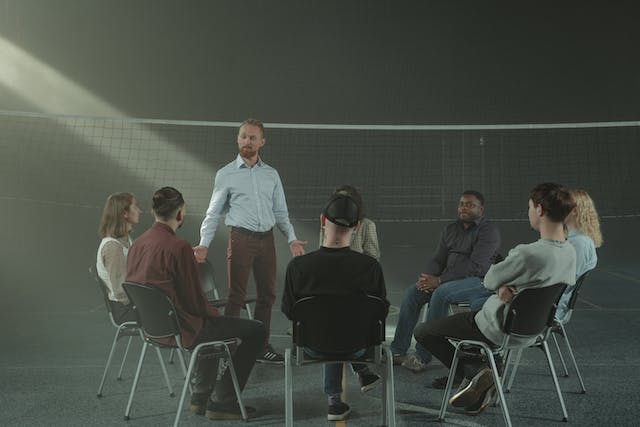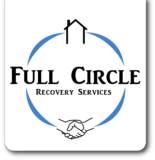Help is available
How to Start
Now is the time to make recovery your first priority
Identifying the most effective care for your treatment needs start with a prescreen to gather basic information for treatment recommendations.
This process begins with:
- The completion of the Referral and Screening Form and the Authorization to Release and Exchange Information Form.
- Preset appointment through our Outreach Staff arranged by calling the
INTAKE HOTLINE: (800) 829-5461. - An intake assessment with our professional staff to discuss your physical, mental, social, and emotional health history.
Treatment options available
Length of treatment will be determined on the results of your initial assessment.
Our Programs

Partial Hospitalization Program (PHP)
Our intake team may recommend our Partial Hospitalization Program (PHP) to start your treatment plan of care to address your substance abuse concerns. The recommendation is built on the results of your initial assessment. PHP at Full Circle Recovery Services is unique with a person-centered approach to addiction treatment. Our team of experienced staff provides dedication and the highest value in treatment programming for people who are ready for recovery.
PHP is appropriate for individuals who have completed
- Inpatient
- Detox
PHP addresses a wide range of addiction concerns and allows individuals to start their journey towards stability in managing
- Drug or alcohol abuse and addiction
- Mental health symptoms associated with substance abuse and recovery efforts
What to Expect
Programming may be recommended for stability on an average of 28 days and is based on therapeutic progress and meeting of treatment goals in programming:
- Individual counseling sessions
- Case management sessions
- Group 7-days per week
- Nurse visit(s)
- Provider visit(s)
- Medication management plans
- Collaboration with community-based agency for sober living with transportation to programming
- Mental Health assessment
Our PHP program is structured and proven to be most successful in helping achieve increased self-awareness, learn and practice healthy behaviors, and positive social interactions. Providers use a range of therapeutic methods, such as Cognitive Behavioral Therapy (CBT), Motivational Interviewing (MI), Solution-Focused (SF), and Dialectical Behavioral Therapy (DBT) interventions to name a few.
Group topics may include:
- Self-care
- Relapse prevention and triggers
- Family and relationship dynamics
- Grief and loss
- Conflict resolution
- Self-esteem
- Coping skills
Other activities could include
- Mindfulness activities, such as yoga, art, or music
PHP may be followed by a transition to our Intensive Outpatient Program (IOP) as part of your recovery journey. Alternatively, our clinical team can work with you to link you with community-based providers to maintain growth and continue your recovery.

Intensive Outpatient Program (IOP)
To start your IOP Program an initial assessment is required or alternatively you can graduate from the PHP program as a next step.
IOP is appropriate for individuals who have completed
- Partial Hospitalization Program (PHP)
- Residential Programming
- Sober due to structured environment (case by case determination)
IOP addresses a wide range of addiction concerns and allows individuals to start their journey towards stability in managing
- Drug or alcohol abuse and addiction
- Mental health symptoms associated with substance abuse and recovery efforts
What to Expect
Programming may be recommended for stability on an average of 120 – 180 days and is based on therapeutic progress and meeting of treatment goals in programming:
- Individual counseling sessions
- Case management sessions
- Group 5-days per week
- Nurse visit(s)
- Provider visit(s)
- Medication management plans
- Collaboration with community-based agency for sober living with transportation to programming the first 120 days (based on program location)
- Mental Health assessment
Our IOP program is structured and proven to be most successful in helping achieve increased self-awareness, learn and practice healthy behaviors, and positive social interactions. Providers use a range of therapeutic methods, such as Cognitive Behavioral Therapy (CBT), Motivational Interviewing (MI), Solution-Focused (SF), and Dialectical Behavioral Therapy (DBT) interventions to name a few.
Group topics may include:
- Self-care
- Relapse prevention, triggers, and warning signs
- Family and relationship dynamics
- Grief and loss
- Self-esteem
- Coping skills
- Building sober support in the community
- Coping with a mental health diagnosis
- Life experiences and behavioral impact
- Understanding moods and emotions
- Communication and conflict resolution
- Self-identity
- Identifying problems and finding solutions
Other activities could include
- Mindfulness activities, such as yoga, art, or music
IOP may be followed by a transition to our Standard Outpatient Program (SOP) as part of your recovery journey. Alternatively, our clinical team can work with you to link you with community-based providers to maintain growth and continue your recovery.

Standard Outpatient Program (SOP)
Our Standard Outpatient Program (SOP) is a natural progression from our IOP to continue and sustain your recovery efforts from substance abuse. The recommendation is built on the results from individualized treatment planning and need for continued support.
SOP is appropriate for individuals who have completed
- Intensive Outpatient Program (IOP) after 180 days
SOP addresses a wide range of addiction concerns and allows individuals to start their journey towards stability in managing
- Drug or alcohol abuse and addiction
- Mental health symptoms associated with substance abuse and recovery efforts
- Established support in the community including
- Employment
- Family
- Setting boundaries, etc…
What to Expect
Programming may be recommended for stability on an average of 180 days and is based on therapeutic progress and meeting of treatment goals in programming:
- Individual counseling sessions
- Case management sessions
- Group 2-days per week
- Nurse visit(s)
- Provider visit(s)
- Medication management plans
- Collaboration with community-based agency for sober living and/or independent living
- Management of mental health appointments
Our SOP program is structured and proven to be most successful in helping achieve increased self-awareness, learn and practice healthy behaviors, and positive social interactions. Providers use a range of therapeutic methods, such as Cognitive Behavioral Therapy (CBT), Motivational Interviewing (MI), Solution-Focused (SF), and Dialectical Behavioral Therapy (DBT) interventions to name a few.
Group topics may include:
- Identification of continued self-care
- Re-evaluation of relapse prevention plans, triggers, and warning signs
- Concerns related to family and relationship dynamics
- Grief and loss
- Continued building of self-esteem
- Continued maintenance of coping skills
- Continual building of sober support in the community
- Coping with a mental health diagnosis
- Life experiences and behavioral impact
- Understanding moods and emotions
- Communication and conflict resolution
- Self-identity
- Identifying problems and finding solutions
Other activities could include
- Linkage to mindfulness activities, such as yoga, art, or music within the community
SOP may be followed by a transition to our Standard Outpatient Program (SOP) Maintenance Program as part of your recovery journey. Alternatively, our clinical team can work with you to link you with community-based providers to maintain growth and continue your recovery.

Maintenance in our Standard Outpatient Program (SOP)
Our Maintenance program is a continued step within our Standard Outpatient Program (SOP) to help sustain long-term recovery efforts from substance abuse and mental health concerns.
SOP Maintenance is appropriate for individuals who have completed
- Standard Outpatient Program (SOP) after 180 days
The SOP Maintenance Program addresses a wide range of recovery concerns and allows individuals to continue their journey towards stability in managing
- Recovery efforts
- Ongoing mental health symptoms associated with substance abuse and recovery efforts
- Established support in the community including
- Employment
- Family
- Setting boundaries, etc…
What to Expect
Programming may be recommended for stability on an average of 180 days and is based on therapeutic progress and meeting of treatment goals in programming:
- Individual counseling sessions (weekly, bi-weekly, or monthly)
- Case management sessions upon request and/or need
- Request for engagement in group (2-days per week)
- Requested Nurse visit(s)
- Monthly Provider visit(s)
- Maintenance of medication management plans
- Collaboration with community-based agency for independent living
- Management of mental health appointments (weekly, bi-weekly, or monthly)
Our SOP Maintenance program is structured and proven to be most successful in helping achieve increased self-awareness, learn and practice healthy behaviors, and positive social interactions. Providers use a range of therapeutic methods, such as Cognitive Behavioral Therapy (CBT), Motivational Interviewing (MI), Solution-Focused (SF), and Dialectical Behavioral Therapy (DBT) interventions to name a few.
Group topics may include:
- Identification of continued self-care
- Re-evaluation of relapse prevention plans, triggers, and warning signs
- Concerns related to family and relationship dynamics
- Grief and loss
- Continued building of self-esteem
- Continued maintenance of coping skills
- Continual building of sober support in the community
- Coping with a mental health diagnosis
- Life experiences and behavioral impact
- Understanding moods and emotions
- Communication and conflict resolution
- Self-identity
- Identifying problems and finding solutions
Other activities could include
- Linkage to mindfulness activities, such as yoga, art, or music within the community

Intensive Outpatient Program (IOP) (Re-entry for Women)
Our Clinical team may recommend our Re-entry program during your treatment planning. The recommendation is built on the results or your initial assessment, current and past legal obligations and barriers towards successful treatment and long-term sobriety. Re-entry at Full Circle Recovery Services is unique with a person-centered approach to addiction treatment. Our Re-entry team of experienced staff provides dedication and the highest value in treatment programming for people who are ready for recovery but have legal barriers.
The Re-Entry Program is an intensive, gender-specific group (females or males only) offered to clients ages 18 and up to provide clients with the appropriate tools to remain sober, develop support, and enhance family and community relationships. The Re-Entry IOP program will take approximately 6-8 months to complete and is dependent on individual progress and needs. Clients may remain in Full Circle programming for up to 2 years.
Re-entry is appropriate for individuals who have completed
- Partial Hospitalization Program (PHP)
- Residential Programming
- Sober due to structured environment (case by case determination)
- Continued use despite being in a sober environment (jail or prison)
Re-entry addresses a wide range of addiction, legal, and community concerns and allows individuals to continue their journey towards stability in managing
- Drug or alcohol abuse and addiction
- Mental health symptoms associated with substance abuse and recovery efforts
- Multiple incarcerations
- Probation and parole
- Meeting court expectations towards treatment efforts
What to Expect
Programming may be recommended for stability on an average of 150 – 180 days and is based on therapeutic progress and meeting of treatment goals in programming:
- Individual counseling sessions
- Case management sessions
- Group 5-days per week
- Nurse visit(s)
- Provider visit(s)
- Medication management plans
- Collaboration with community-based agency for sober living with transportation to programming the first 120 days (based on program location)
- Mental Health assessment
Our Re-entry (IOP) program is structured and proven to be most successful in helping achieve increased self-awareness, learn and practice healthy behaviors, and positive social interactions. Providers use a range of therapeutic methods, such as Cognitive Behavioral Therapy (CBT), Motivational Interviewing (MI), Solution-Focused (SF), and Dialectical Behavioral Therapy (DBT) interventions to name a few.
Phase Work includes:
- Clients complete different phases to help facilitate their understanding of self and aid in relapse rates:
- Clients complete phase work to hold them accountable to meet obligations for recovery, treatment, legal, and the community that were once barriers to being successful.
- Clients complete different phases to help facilitate their understanding of self and aid in relapse rates:
Group topics may include:
- Expectations of treatment and legal obligations
- Obtaining community resources
- Substance abuse and mental health treatment
- Personal values/beliefs
- Vocational planning and preparation
- Financial literacy
- Goal planning
- Effective communication skills
- Decision making
- Anger management
- Self-confidence and self-esteem
- Healthy relationships
- Sober support
- Community transition
- Personal care (hygiene, prevention/treatment, sleep, physical fitness)
- Nutrition (grocery shopping, meal prep)
- Benefits counseling (insurance, food assistance)
- Obtaining state documents (state ID, driver’s license, SS card, birth certificate)
- Transportation (bus pass)
- Employment
- Housing
- Education (GED, college, trade school)
- Legal (probation, parole, attorney)
- Healthcare (medical, dental)
- Assistance with reunification plans
- Support groups (AA/NA, SMART, grief, domestic violence, HIV/AIDS, church)
- Skill building (planning, focus, self-control, awareness, flexibility)
- Volunteering
- Leisure activities
- Stress management
Other activities could include
- Conferences with probation, parole, courts, children services, and other community-based agencies as necessary to enhance recovery and treatment efforts.
All programs include
Daily Group Counseling
Therapy with fully licensed and experienced Group Leaders.
Individual Counseling
One to one session through the week with certified Clinicians.
Case Management
Activities designed to support patients with needed social, educational, financial, workforce and medical services. Essential for maintaining a healthy, happy and independent life.
Medical Support
Scheduled appointments with nurses to include weekly health education and periodic sessions with a Nurse Practitioner to oversee any medical issues or questions.
